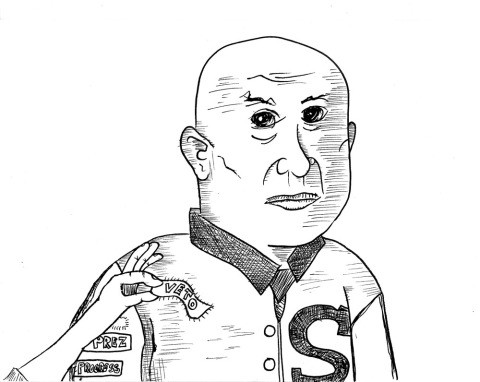 Despite accepting a three-year agreement with the University of Saskatchewan Faculty Association ending the controversial presidential veto, the U of S Board of Governors believes that the president still has the right to veto tenure.
Despite accepting a three-year agreement with the University of Saskatchewan Faculty Association ending the controversial presidential veto, the U of S Board of Governors believes that the president still has the right to veto tenure.
On Oct. 9, the board signed the 2014–17 collective agreement and withdrew the president’s ability to veto the awarding of tenure. Previous to the agreement being reached, the board had delegated its authority for awarding tenure to the president.
“The board has the legal authority to delegate decisions of the board to an officer of the board,” said interim provost and vice-president academic Ernie Barber. “The president is an officer of the board. The board decided that it would delegate its board authority over tenure decisions to the president and to the president alone — and hence came the concept of a presidential veto.”
Although the board has final authority over tenure according to the previous collective agreement, Chief Justice of the Court of Queen’s Bench Robert Laing does not believe that the U of S’ president was justified in denying a U of S professor’s tenure in 2010. In a recent decision, Laing sided with the faculty association and concluded that president Peter MacKinnon did not have the right to deny the professor’s tenure after an appeal committee voted unanimously to grant it.
The decision was based on the fact that the University of Saskatchewan Act, the university’s constitution, does not explicitly state that the board of governors has authority over tenure.
“The act does not explicitly use the word ‘tenure’ but rather it talks about permanent academic appointments,” said Barber. “But the way that you achieve permanent academic appointments is through tenure, so we believe that the act applies.”
The board is now asking the Saskatchewan Court of Appeal to reconsider the decision. Barber says the appeal will allow the university to clarify ambiguities about governance, specifically on whether the board gets its authority for tenure decisions from the University of Saskatchewan Act or from the collective agreement.
“The recent court decisions, however, have cast doubt on whether the board does have that authority under the act to approve tenure,” Barber said. “We believe that it’s an important case of law and an important principle that we establish that the board gets its authority for tenure through the act and not just through the collective agreement. We believe that’s what the act says.”
The board filed the appeal on Oct. 15. Barber says Laing’s decision seems to give the faculty’s collective agreement more weight than the University of Saskatchewan Act.
“For the longest time now the University of Saskatchewan has been working under the understanding that the intent of the University of Saskatchewan Act is that the Board of Governors has a legislative authority under the act for awarding tenure,” said Barber. “We believe the authority for tenure should be a legislative authority and not just a negotiated authority. Something as important as tenure we think is too important to be negotiated away.”
In practical terms, says Barber, the collective agreement already gives the Board of Governors authority over tenure decisions. However, the board would like clarification that it gets its power from the university act and not the collective agreement.
“We want to be clear that the University of Saskatchewan Act empowers the board to make the final approval of tenure,” Barber said. In either case, Barber says the board will rescind its delegation of authority over tenure decisions to the president.
It could be many months before the case is heard in front of the Court of Appeal and a decision is made.
“The reality is that there’s a lack of clarity,” Barber said. “We don’t see any other way to get this clarification than to go to the courts.”
—
Graphic: Dan Smolinski
Leave a Reply